
When tenor Pene Pati reflects on his journey to the stages of the world’s top opera houses, he still sounds as if he’s in awe of it all.
Singing had long been culturally embedded in the Samoan-born, New Zealand-raised Pati’s life. It was akin to walking, he said, because in Polynesia, folklore is passed down through song. His official introduction to Western classical music was in high school, when he joined the choir because he wanted to play on the rugby team (it was a school requirement). His introduction to opera — and subsequent decision to focus on the art form — came several years later.
After arriving in San Francisco in 2013 for the Merola Opera Program, Pati realized his peers had been immersed in the opera world for most of their lives and knew all the famous arias by heart. He, on the other hand, had been receiving formal opera training for just two years and felt so unqualified that he asked to be let go from the program. (They convinced him to stay.)
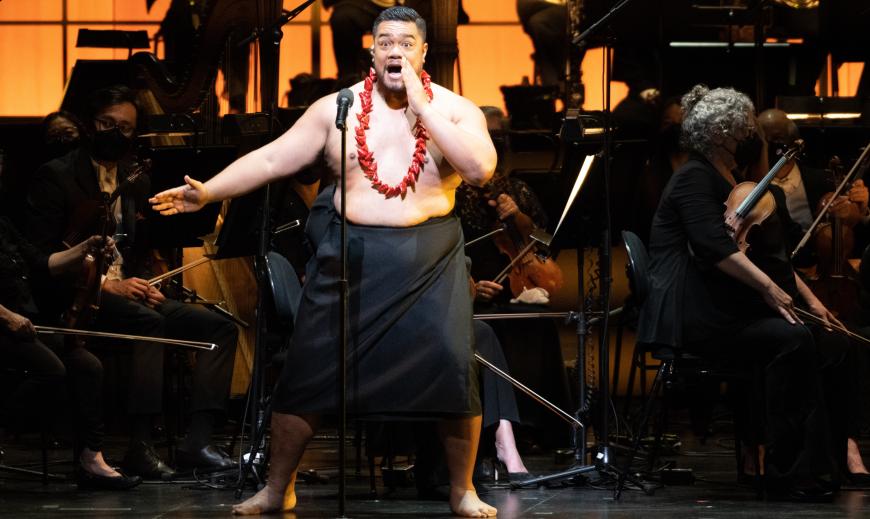
There was also the lack of Pacific Islander representation in opera, which meant there were few, if any, opera singers with similar backgrounds to whom he could look for inspiration. The words of some well-intentioned mentors, who told him that, realistically, the odds of someone from the islands getting far in the opera world were low, rang loud.
Lately, Pati has noticed more diversity on the stage. “I would like to think that my hardships paid off to something or that I’ve motivated or inspired somebody,” he said in a recent conversation with SF Classical Voice. But even so, he can still count the number of Pacific Islander classical singers on one hand. It’s a step in the right direction: “It’s better than not being able to count at all,” he said. “I feel like I have people beside me, and it’s a good feeling.”
After his breakthrough as the lecherous Duke of Mantua in Verdi’s Rigoletto with San Francisco Opera in 2017, Pati went on to perform at the Opéra National de Paris, Opéra Comique, Opéra National de Bordeaux, and Staatsoper Berlin, among many others.
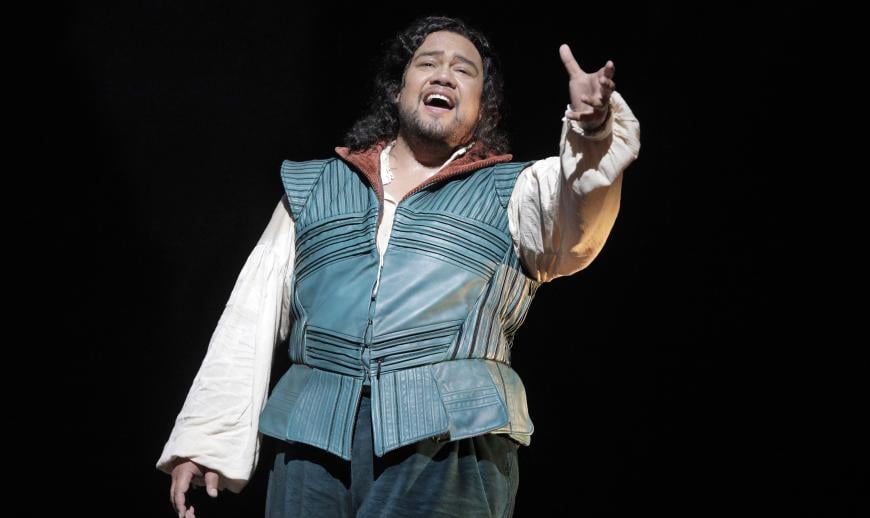
In 2019, he stepped in as Romeo in Charles Gounod’s Romeo and Juliet on opening night at SF Opera, a performance lauded by the San Francisco Chronicle. “Pati sings in a gleaming, sensuous stream of sound, with heroic accents in more athletic passages and a warm, tenderly inviting depth for moments of romantic intimacy,” wrote Joshua Kosman.
Pati, who now lives in Paris with his wife and fellow opera singer, Amina Edris, is set to make his much-awaited return to SF Opera as the lovestruck Nemorino in Gaetano Donizetti’s The Elixir of Love, which runs Nov. 19 – Dec. 9.
SFCV caught up with Pati in between rehearsals in San Francisco. Topics ranged from his experience in the Merola and Adler Fellowship programs to why he formed a crossover pop trio with his family and why he sees his younger self reflected in Nemorino’s character.
You last performed in San Francisco last year as part of SF Opera’s mesmerizing centennial season opening-night concert. What’s it like to return?
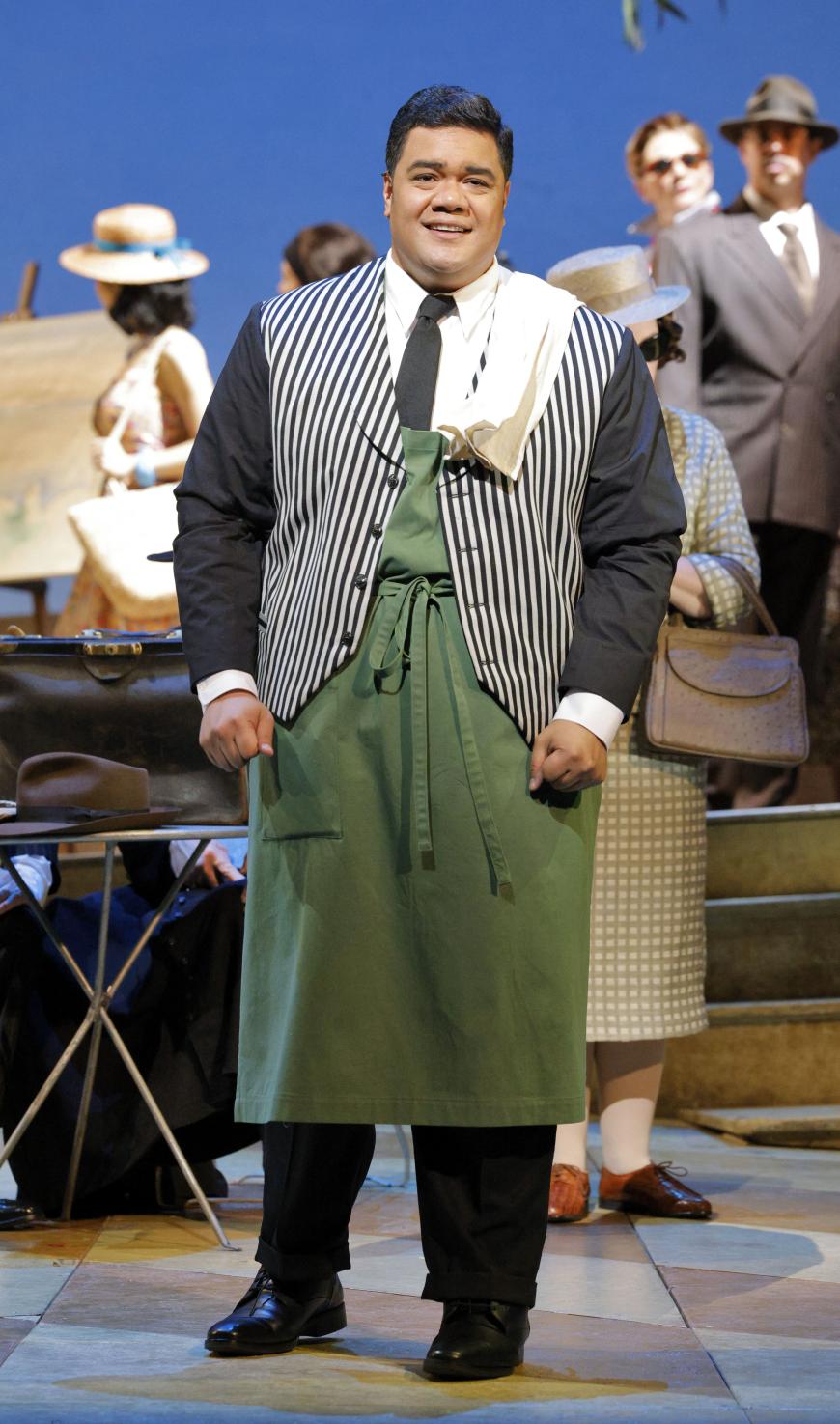
I absolutely love it. You don’t know what you missed until you leave and come back. You walk in, [and] you take a deep breath and say, “I’m home. I know where everything is. I know how the rules go around here. I know what to do. I know how to look at the schedules for the next day. I know where the coffee pot is. I know who the chorus members are.” It’s that sense of familiarity that you’ve walked in and you think, “I don’t have to worry about anything or try to impress anybody.” I just think, “Make some mistakes if you have to, look like a fool if you have to, but you know you’re genuinely loved by the company.” For me, that’s the best thing about being home.
You’ve had a long connection with SF Opera, which began in 2013 when you were accepted into the Merola Opera Program. Later on, of course, you became an Adler Fellow. How has your relationship with the company shaped the course of your career?
Ten years ago? Oh, I don’t even feel 10 years older. In 2013, at that time, I didn’t take the Adler the next year. Usually, you do the Merola Program, then if you’re selected, you start straight away as an Adler Fellow. I didn’t take it because I believed at the time that I wasn’t really ready for the stage, and I said, “I will come back in 2015, and I’ll audition for Adler, when I feel like I’m ready to sing at the level San Francisco needs.”
Luckily, I got back in, and from there I honed my skill and really allowed San Francisco to lead the way. For me, walking into these doors 10 years ago as a shy singer who really honestly didn’t believe it would get to now, standing onstage as the lead tenor — this [is] my third lead tenor role — I sometimes pinch myself and think, “How did that even happen?”
At one point, I thought, “I’m going to call it in. I don’t think it’s going to work.” [The team at SF Opera], the entire way, always sat me down and said, “This is the career — either you run from it or learn from it,” from the wise words of The Lion King. They always informed my choices and gave me a good heads-up on what needed to be done and how to be a better singer. I would say that my relationship with San Francisco has truly created me as an artist.
What were some of the defining moments from your time in the Merola and Adler programs?
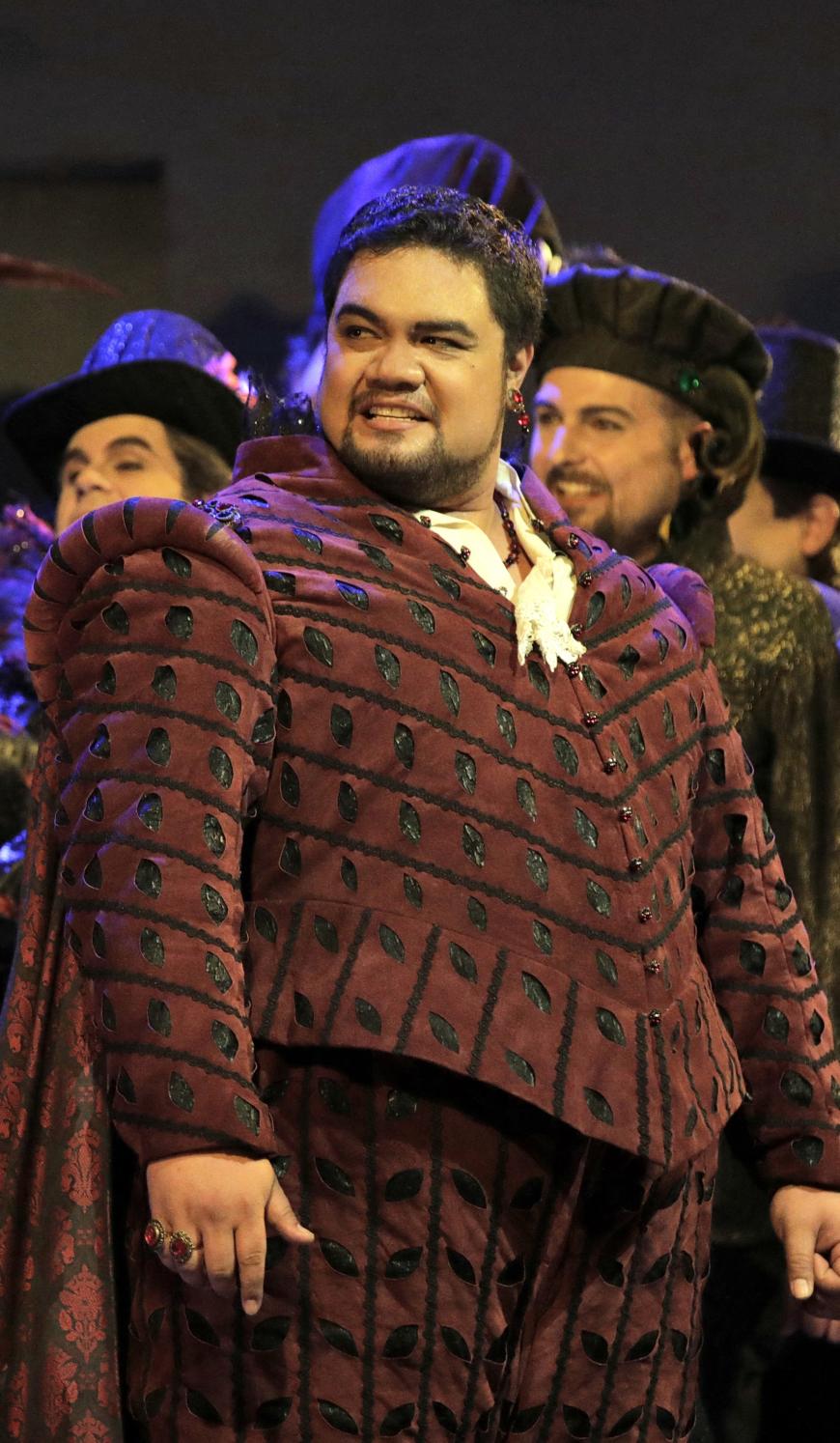
It’s a funny story. In the second week of Merola, I heard all the Merolini sing, and I asked the boss at the time, Sheri Greenawald, if we could talk. I truthfully said, “I’m not even up to the standard of these singers, and I don’t know why you took me, but I think you should release me.” She calmed me down, and I said, “No, no, no … I’m seriously not up to par.” She sat me down and said, “Just give it a shot, sing your best, and see where it leads.”
For Adler, the defining moment for me was that I got selected to sing the role of the Duke [in Rigoletto], which was obviously a huge undertaking in my second year. It’s rare to give a young artist the lead tenor role and for the entire run. Usually, they only give you like … one show, but they gave me the entire run. I had to clean my ears out several times because I thought they were lying to me.
I started learning the role a year before I actually [performed it onstage] because I was so nervous. I don’t know — you start as a student, and you wonder [whether] one day you’ll sing on the mainstage, and suddenly it was around the corner. So that was a defining moment, finally when the curtain went up, and I thought, “Wow, I actually did it.”
And from there your career took off.
It really did, and it took off fast. What’s funny is that how Europe happened was there was a conductor named Marc Minkowski [at SF Opera]. He was conducting [Mozart’s Don] Giovanni at the time, and he — it wasn’t even because I was singing the Duke — said he loved my work ethic. … He offered me my first job in Bordeaux, France — it was a role in [Donizetti’s] Anna Bolena — purely based on this. As soon as I sang in France, it just went off from there. Thankfully, it came … during the sweet spot before the pandemic hit.
Where does your love of singing come from?
It’s culturally embedded for me. In the Pacific Islands and Polynesia, singing is just part of life. You sing at church. You sing your myths and legends. Nothing was written down, and you sing the stories of the past to the next generations. Because of that, you’ve just grown up thinking that everybody sings because it’s so common. I always knew I could sing, but I never knew it was a talent. I just thought singing is like walking — like, everybody walks. Everybody sings in the islands, so I never really had a love for it more than I had a need for it. I had to sing because it was part of my life.

Back in high school, you weren’t allowed to play rugby unless you were singing in the choir. … I said, “OK, fine, I’ll do anything to play rugby.” The reason I got into classical singing was through this choral connection. From there, it really moved forward. I thought, “I love this harmony, and I love this singing, and I really want to be able to continue doing this.” That’s where it all started.
You’ve also worked as a hip-hop producer. Could you tell us more about that?
I always loved hip-hop and R&B. I was a music producer in high school, and I would do all these hip-hop, R&B, gospel albums. I did everything but classical music, but I think that what informs my classical music style is the fact that I wasn’t raised doing classical. I came in with a different view of what I thought classical was, and I feel like I added a little bit of a freshness.
It wasn’t to the taste of a lot of people. The purists will always say, “What is he doing? Why is he singing like this?” But for a lot of other singers, they’d be like, “Wow, that is a different color!” So that journey from learning … all these other styles — I don’t regret it at all. Like I feel like that is a huge part of why I sing classical the way I do.
How did Sol3 Mio, your family trio, come about?
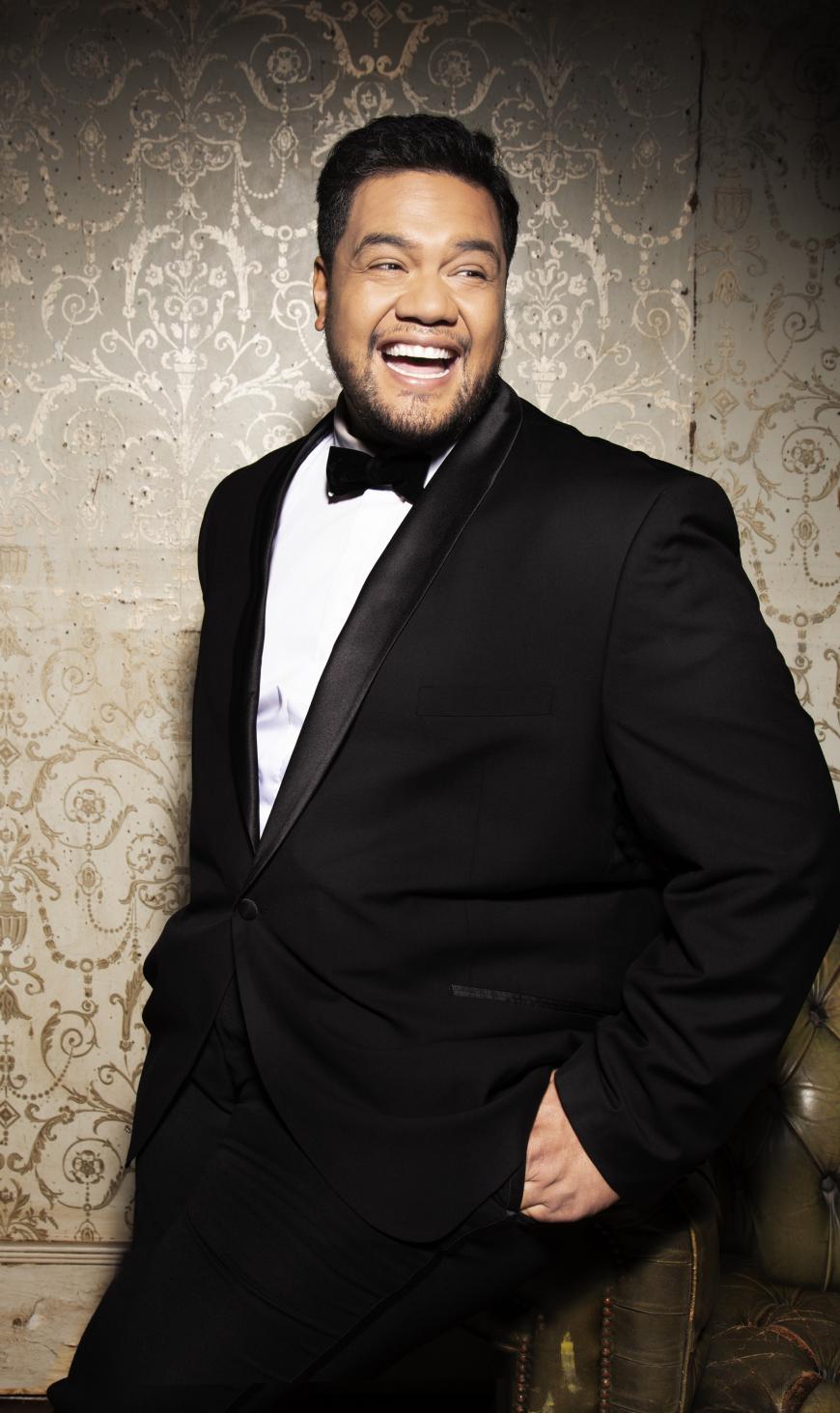
The group started because we were looking for a way to pursue our opera careers. At the time that we were studying, there was no real support for Polynesian singers. To have three Polynesian boys decide to chase opera [with] no funding available. … We said, “You know what? How about we try to fund ourselves so that we prove everybody wrong.”
That was the primary reason why we started the group: because we decided to go around New Zealand, sing, and fundraise money in order to pay for our education. Because of that, [the trio went] viral, and it became huge, and everyone was signed after two weeks to Universal Music. And it just went haywire. On our first week, we were singing at a school for like 50 to 60 people, and we were so happy [to have] made a little bit of cash, and we fed everybody. … Then, two weeks later, we had sold out the town hall — 4,000 people. I just don’t know how that happened.
If it weren’t for [the trio], would I still be here? Maybe — it would have been a little bit harder. But I feel like it’s nice to look back and say [that] because we wanted to do it, we formed this group rather than … looking around for handouts.
We are about to start putting together the last album. We’re [contracted] to have five albums with Universal. We’ve got a tour planned for next year again for New Zealand, Australia, and possibly the Pacific. So it’s all still going, but it’s quite nice that the boys are individually doing opera.
You last played Nemorino at the Paris Opera in 2021. What excites you about returning to this character?
It’s one of the roles that I truly can relate to. I think that what makes me most excited is that it’s obviously a young man who’s in love with somebody who thinks that he doesn’t have what it takes to win her love, and then he resorts to the “potion,” which he believes [will work]. I see him as more innocent than he is stupid and naive. Unfortunately, a lot of [productions] like to portray him as an idiot … but I see him as more someone who’s just innocently in love to the point that he will do anything to get the girl’s attention.
I feel like I was always that kind of boy when I was young because I’m not a small dude. I don’t have a six-pack. And I [was always too shy] to approach any girl, and I would always think she wouldn’t even look twice my way.
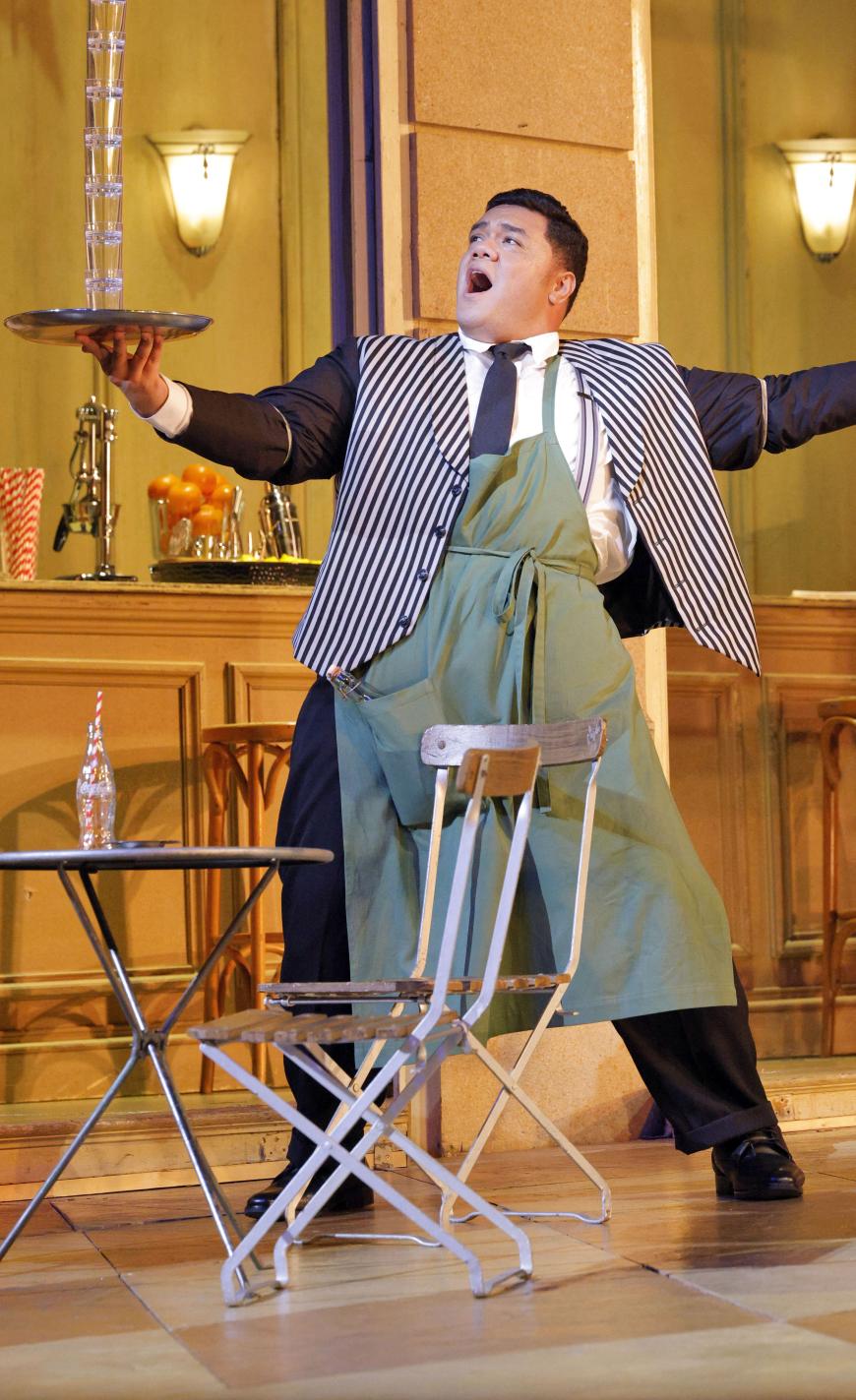
I relate to this character because I’ve lived his life, or he’s lived mine. So it’s exciting to put this onstage because instead of being Nemorino, I’m legit just being young Pene Pati.
Were you like that when you first met your wife Amina?
There’s a moment when we first met. I was so naive in the sense that I really liked her but I was too scared, too chicken to ask her out. And right at a moment when we were about to [part], she thought I was going to kiss her, but I said, “I really don’t have the courage to kiss you.” So I just walked away. Someone else probably would have really taken that opportunity, but I didn’t want to be that [kind of] guy who leans in for a kiss and [hears], “What the hell are you doing?” Yeah, I had the exact same feeling when I met Amina.
Has your interpretation of Nemorino evolved since you last performed the role?
Not so much because I’m taking from my past experience and, of course, my past experience has never changed. I try to keep it as simple as possible. I don’t overcomplicate him because I feel like if I overcomplicate it, then he becomes some sort of caricature onstage, and then people don’t see Nemorino. They think, “Oh, he’s just playing up this funny kid who’s not getting anything.” Whereas if you play it very realistically, and people can say, “Man, that was me too,” [then] they can relate to it. So the character itself hasn’t really changed that much since Paris — of course, I understand him [better] the more times I sing him — but the essence of his character hasn’t changed much.
When people see [my Nemorino], they can all understand that it’s really an honest, innocent feeling of, like, “I really want to love you, but I don’t know what to do about it.” I love taking people on that journey. … There’s this part in the middle where the music slows down, and he has this genuine scene. And a lot of people [might] say, “Oh, you know, it’s just a nice, cute part where you sing.” But in rehearsal, the girl who’s playing [Adina, soprano Slávka Zámečníková,] said, “Oh my god, I really felt sorry for you, and I felt so bad that I was doing all these things to you.” And I was like, “Well, it’s because I’m actually singing from my heart at that point.”




